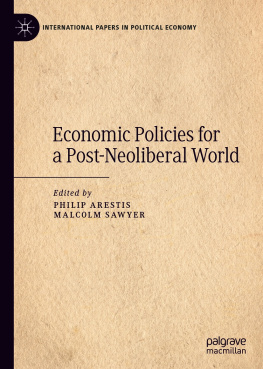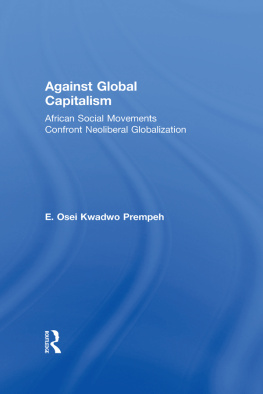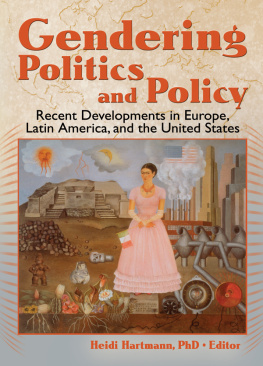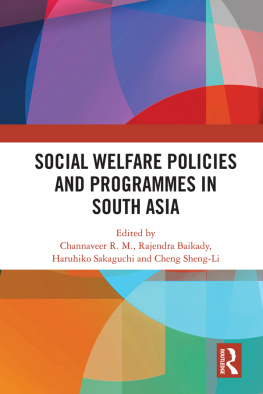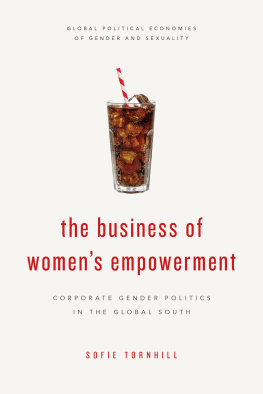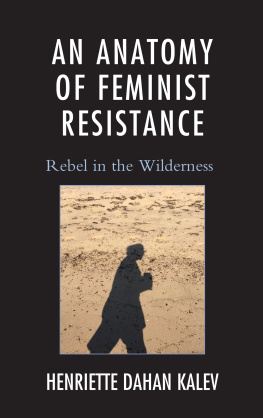THE WAGES OF EMPIRE
TRANSNATIONAL FEMINIST STUDIES
KAMALA KEMPADOO, SERIES EDITOR
York University, Toronto, Canada
Books in the Series:
The Wages of Empire: Neoliberal Policies, Repression, and Womens Poverty edited by Amalia L. Cabezas, Ellen Reese, and Marguerite Waller
Forthcoming:
Transformations: Feminist Pathways to Global Change edited by Torry Dickinson and Robert Schaeffer
From Hollywood to Bollywood: The Cinema of South Asians Abroad by Shoba S. Rajgopal
The Wages of Empire
NEOLIBERAL POLICIES, REPRESSION, AND WOMENS POVERTY
edited by
Amalia L. Cabezas, Ellen Reese, and Marguerite Waller
First published 2007 by Paradigm Publishers
Published 2016 by Routledge
2 Park Square, Milton Park, Abingdon, Oxon OX14 4RN
711 Third Avenue, New York, NY 10017, USA
Routledge is an imprint of the Taylor & Francis Group, an informa business
Copyright 2007, Taylor & Francis.
All rights reserved. No part of this book may be reprinted or reproduced or utilised in any form or by any electronic, mechanical, or other means, now known or hereafter invented, including photocopying and recording, or in any information storage or retrieval system, without permission in writing from the publishers.
Notice:
Product or corporate names may be trademarks or registered trademarks, and are used only for identification and explanation without intent to infringe.
Library of Congress Catalogng-n-Publcaton Data
The wages of empire : neoliberal policies, repression, and womens poverty / edited by Amalia L. Cabezas, Ellen Reese, Marguerite Waller.
p. cm. (Transnational feminist studies)
Includes bibliographical references and index.
ISBN 978-1-59451-347-3 (hc : alk. paper) ISBN 978-1-59451-348-0 (pbk.)
1. WomenEconomic conditionsCross-cultural studies. 2. WomenEconomic conditionsDeveloping countries. 3. Sex discrimination against womenCross-cultural studies. 4. GlobalizationEconomic aspects. 5. International tradeEconomic aspects. I. Cabezas, Amalia L. II. Reese, Ellen, 1969 III. Waller, Marguerite R., 1948
HQ1381.W35 2007
362.83086942dc22
2007014788
Designed and Typeset by Straight Creek Bookmakers.
ISBN 13 : 978-1-59451-347-3 (hbk)
ISBN 13 : 978-1-59451-348-0 (pbk)
Contents
Bernardo Useche and Amalia L. Cabezas
Ananya Roy
Jennifer Lynn Stoever
Piya Chatterjee
Marina Karides
Ellen Reese
Tracy Fisher
Joya Misra and Sabine N. Merz
Carolina Bank Muoz
Cynthia Mellon
Jill Esbenshade
Caitilyn Allen
Jennifer C. Olmsted
Joy Ngozi Ezeilo
Sonali Kolhatkar
This book could not have come into existence without the support of many individuals, groups, and institutions. We are, first of all, deeply indebted to all our contributors, whose dedication and hard work in bringing together the textures, implications, and brute facts of the impact of neoliberal globalization on low-income women are the substance of this volume. We and they are even more deeply indebted to the many women around the world who have given of their time and allowed their experiences, analyses, and feelings to be represented here.
Financial support for this project was provided by the Cloning Cultures project, funded by a generous grant from the Ford Foundation and administered by the Center for Ideas and Society (CIS) at the University of California Riverside and the University of California Humanities Research Institute. In particular, we would like to acknowledge the crucial roles played by Piya Chatterjee and Emory Elliott of U.C. Riverside and Philomena Essed and David Theo Goldberg of the U.C. Humanities Research Institute, who conceptualized and administered the Cloning Cultures project. We also warmly thank Laura Lozon, director of the Center for Ideas and Society, who provided invaluable logistical and administrative support. The Ford Foundation grant also provided us the editorial and research assistance of three highly capable graduate students, Katrina Paxton, Michael Chavez, and Jenni Keys.
Marguerite Waller and Ellen Reese were in residencies at the CIS in 2003 and 2005 which greatly facilitated the development and exchange of our ideas for this volume. The original group included our UCR colleagues Manali Desai, Tracy Fisher, and Piya Chatterjee, with whom we read and talked extensively in the areas of gender and economics, feminist and womens activism, development, and neoliberal policy. Philomena Essed provided helpful feedback on our proposal for this volume, and the participants in the Cloning Cultures conference at the University of California, Irvine, organized by Philomena Essed, Piya Chatterjee, and Emory Elliott, offered us extremely useful responses to early drafts of several of the essays. The 2004-05 and 2005-06 UCR Mellon Foundation Workshops in the Humanities also financed several series of presentations by scholars and activists whose ideas shaped our thoughts on this topic in significant ways. We thank Thomas Scanlon, Ian Chambers, Vonnie Tessier, Tina Stavrapoulos, Kenneth Barr, Christine Petit, and Linda Kim for their support and assistance in organizing these events.
Amalia Cabezas is grateful for the love and encouragement of Alfredo Cruz, Deena J. Gonzlez, and Ramona Sliva. Ellen Reese would like to thank especially Edna Bonacich, Scott Coltrane, Christopher Chase-Dunn, Rebecca Giem, Christine Gailey, Vincent Geidraitis, Kamala Kempadoo, Ernest Savage III, Eric Vega, and Robin Whittington. Marguerite Waller would like add to her thanks to Steve Cullenberg, Mary Cummins, Eric Field, Sandra Harding, Kathleen Hartford, Emily Hicks, Amy Kofman, Corinne Kumar, Ethan Nasreddin-Longo, Ruth Wallen, and other colleagues, friends, and family members too numerous to name for their guidance, questions, insights, and mindfulness. All three editors join in thanking the librarians at U.C. Riverside for their advice, research assistance, and support for this project.
Not least, we are deeply grateful to our publisher, Dean Birkenkamp, to his managing editor, Melanie Stafford, and to all the others at Paradigm whose commitment and thoughtful guidance have brought this book to completion.
LOOKING BACKWARD: FROM BEIJING TO BRETTON WOODS
We doubt that it was the intention of the statespeople and economists who convened the UN Monetary and Financial Conference in Bretton Woods, New Hampshire, in July 1944, to base the economic growth of corporate capital in the late twentieth and early twenty-first centuries on the superexploitation of women, particularly women of color.1 Nevertheless, by 1995, when the UN Fourth World Conference on Women was convened in Beijing, China, the two institutions that loomed as the biggest contributors to womens poverty, and as the most intransigent obstacles to improving womens health, education, participation in civil society, and general well-being, were the International Monetary Fund (IMF) and the International Bank for Reconstruction and Development (now known as the World Bank). These two financial institutions, created at Bretton Woods, have largely orchestrated the transnational economic restructurings known in the 1970s and 1980s as development and, more recently, as globalization. The General Agreement on Tariffs and Trade (GATT) of 1947 evolved into a complementary third institution, the World Trade Organization (WTO), in 1995, the very year that women were meeting at the UN Conference in Beijing to protest the catastrophic economic policies of the World Bank and the IMF, both of which had, by that time, inflicted malnutrition and starvation, unimaginable violence, and devastating environmental degradation on vast numbers of the worlds peoplewith low-income women and children taking the brunt of these effects.2


